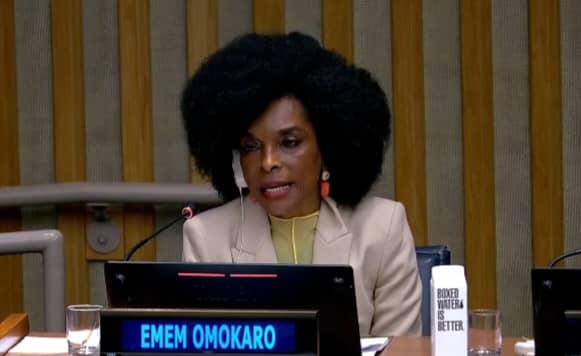By Cecilia Ologunagba
The Director-General, National Senior Citizens Centre, Dr Emem Omokaro, has called on African Countries to establish legal framework to accelerate the implementation of Madrid Plan of Action on Ageing (MIPAA).
Omokaro, who made the call on Wednesday at the ongoing 61st session of the Commission for Social Development (CSocD61) in New York, said that implementation of MIPAA hinged on effective policies backed by strong legal framework.
Omokaro, who is a Panelist at the High-level panel discussion on the Fourth Review and Appraisal of the MPAA, an event held on the sidelines of CSoCD61, presented a statement on behalf of 54 African countries.
The UN Correspondent of the News Agency of Nigeria (NAN) reports the Panelist presented the “Statement of Africa on Fourth Review and Appraisal of the MIPAA in Africa 2018-2022: Key Findings and Recommendation.’’
She said national development plans were critical in policymaking process, citing Nigeria as one of the countries that has established an entity- National Senior Citizens Centre- on ageing.
“For MIPAA to move forward, there has to be legal backing; Nigeria is an example, for a long time, 20 years, we didn’t know what MIPAA was, we never used MIPAA but with the National Senior Citizens Act and the setting up of a legal entity in-charge of ageing, there is no coordination.
“Now, there is multisectoral coordination, and review and appraisal of MIPAA was very easy so African countries should really emphasise the establishment of legal frameworks to back up policies framework,’
“There cannot be a dichotomy; when you have a strong policies framework, there has to be strong legal framework.
“There cannot be a dichotomy; when you have a strong policies framework, there has to be strong legal framework.
“I believe that the UN Convention on the Rights of Older Persons will provide us the normative standards and the compelling framework to ensure that MIPAA is implemented.’’
According to her, to accelerate localisation and achievement of the aspiration MIPAA, national and regional planning and ageing frameworks establishment by African Union must be aligned with MIPAA.
Adopted in 2002, MIPAA offers a comprehensive action plan for handling the issue of ageing in the 21st-century and for building a society for all ages.
It focuses on three priority areas: older persons and development; advancing health and well-being into old age and ensuring enabling and supportive environments.
Omokaro said accelerating the implementation of the Plan after 20 years, Africa needed to mobilise required financing to accelerate implementation of MIPAA and sustain the gains already made.
“The continent should sustain the gains already made by using national budget processes and increase domestic financing, international financing remains crucial to complement and catalyse domestic financing of ageing programmes,’’ she said.
The panelist, however, recommended that MIPAA should have a specific Monitoring and Evaluation tool and structure that would serve to ensure its consistent implementation and reporting at national, regional and global level.
In addition, she said technology would play an important role in supporting older persons and acerating the implementation of MIPAA, saying, “African countries should embrace technology.
“It should embrace technology to help its ageing population stay economically and socially active, access health and other services, and to live independently with dignity.’’
Omokaro said about one third of African countries (18) had developed comprehensive National Policies on Ageing, strategies and various programmes to implement the targets set in the three priority areas.
She said some had advanced quite well in implementing the various priority areas of MIPAA while others had not gone beyond the phase of formulating strategies.
She further said that MIPAA review in the Africa region revealed that implementation was lagging due to lack of awareness and utilisation of MIPAA as policy instrument.
Omokaro identified lack of national legislation to compel establishment of statutory coordinating entities on Ageing as another challenge in the implementing of the Plan.
“Members States that have done well in the implementation adopted MIPAA and mainstreamed it in the policies and national legislation like Nigeria.
“Nine out of 11 countries that reported significant strides in implementation of MIPAA had enacted laws that clearly established the entitlements of older persons.
“They put a duty of care on public institutions to promote the rights and wellbeing of older persons,’’ she said.
In addition, she said weak institutional and human resources capacity had hampered the implementation of the Plan in Africa, noting that most policy makers, planners and implementers had no training in Ageing policy, strategies and programme design, especially in related field that called for mainstreaming.
NAN reports that MIPAA is the first international agreement which commits governments to linking questions of ageing to other frameworks for social and economic development and human rights.
It also calls for governments to include older people in the development of the policy development process.
Endorsed by 159 governments, the MIPAA is not legally binding and its implementation is voluntary. A participatory review of the Plan is organised every five years, in which older people’s involvement is encouraged. (NAN)


